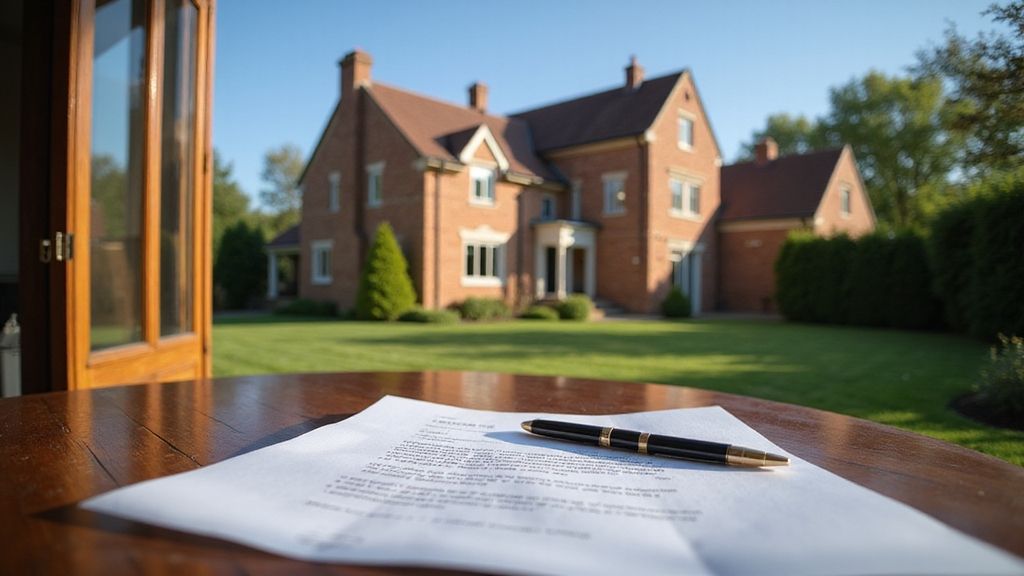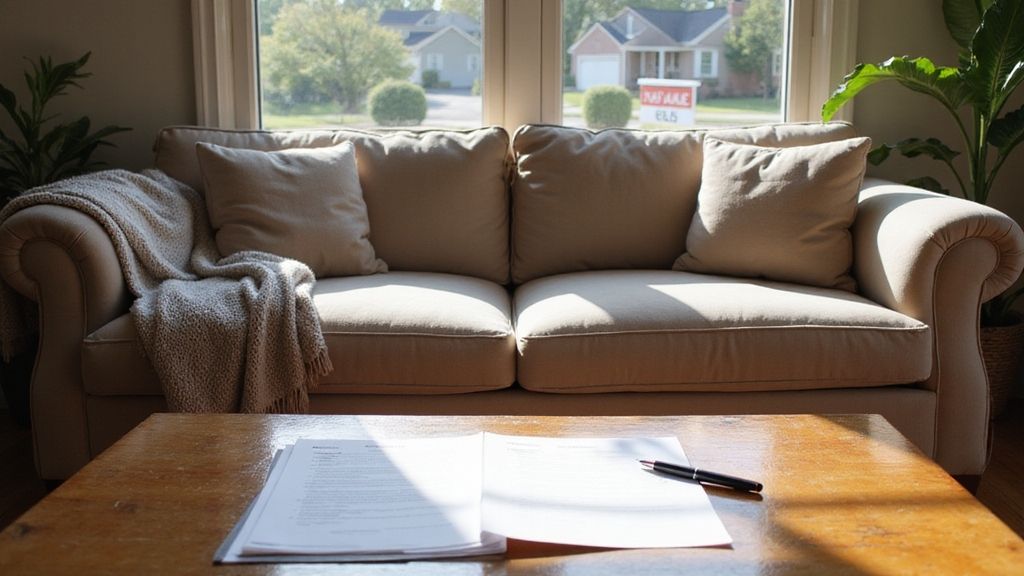A Guide for Selling an Inherited House in Pennsylvania

Inheriting a house in Pennsylvania brings unexpected responsibilities that can feel overwhelming. You face complex legal processes, tax obligations, and emotional decisions about a property you may not want.
Many heirs struggle with understanding probate laws and managing carrying costs while grieving their loss. You might feel stuck with mounting bills, repair costs, and family disagreements about the property.
Multiple heirs can complicate decisions, and an outdated house requires significant investments. These challenges often lead to stress and financial strain.
This comprehensive guide walks you through the process of selling your inherited Pennsylvania house. You will learn about probate requirements, tax implications, and practical solutions to common challenges.
Key Takeaways
- Wait for probate completion in PA (6-12 months) and gather essential documents including death certificate and proof of ownership.
- Assess property condition through professional inspection and address any liens, mortgages, or tax obligations before listing.
- Consider selling to cash buyers for faster transactions without repairs, though expect 50-70% of market value.
- Understand PA tax implications, including property tax (0.98%) and potential capital gains based on inheritance value.
- Ensure all heirs agree on sale terms and coordinate with a title company for proper property transfer documentation.
What Does It Mean to Inherit a House?
A house inheritance means you become the legal owner when someone passes away and leaves it to you. You can receive the property through a will, trust, or state laws. The property’s value at the time of death becomes your tax basis.

You must complete several legal steps before selling an inherited home. The estate will go through probate court first. A judge must verify the will and approve the distribution of assets. You need to gather important papers for the sale process.
These documents include the death certificate and proof of ownership. The probate court must confirm the legal transfer of the house. You can start selling the property only after completing these requirements.
Understanding the Probate Process in Pennsylvania
The probate process lets PA courts handle a deceased person’s assets and debts legally. You must start probate court proceedings to claim ownership of inherited property legally. The court needs about six months to one year to complete this process. They will review all documents and oversee asset distribution.
Standard probate applies to estates worth more than $40,000 in Pennsylvania. Yet smaller estates can use a simpler probate process. You should file the will at the Probate Division within one year. The court must transfer ownership before you can sell any inherited property. Your executor needs to submit a death certificate and legal papers.
This process ensures fair distribution of assets to rightful heirs. We recommend working with a probate lawyer for complex cases. The court protects everyone’s interests throughout the proceedings. It verifies debts and resolves claims against the estate.
Key Steps to Sell an Inherited House
To initiate the sale of your inherited Pennsylvania property, you’ll need to complete the probate process and gather essential documents like the death certificate, property title, and tax records.
You must assess the property’s current condition through a professional inspection and obtain a comparative market analysis to determine its accurate value.
Before listing, you’ll need to address any outstanding mortgages, liens, or tax obligations, and consider whether you’ll sell through traditional real estate channels or opt for alternative methods like iBuyers or FSBO.
Understand the Inheritance Process
Pennsylvania inheritance process requires specific legal steps to handle property after someone’s death. You must go through probate unless the house was in a trust.
This process usually takes between six months to one year. The state does not collect estate taxes from inheritances. You should check federal tax rules if the estate is worth over $13.99 million.
The property transfer follows the instructions in the will. If no will exists, state laws determine who receives the assets. A trust can help you avoid the probate process entirely. This option makes selling inherited property much faster.
You need several key documents before selling the house. These include a death certificate and proof of ownership. The property title records must also be clear and up to date.
Gather Necessary Documentation
You need specific documents to legally sell an inherited property in PA. The death certificate proves your right to inherit the property. You must get this document from the probate court first.
Title records will show the history of property ownership and any existing liens. The probate court papers confirm your legal status as the new owner. You should check the property tax records for any unpaid taxes.
Title companies need these papers before they start the selling process. We recommend keeping these documents in a safe and organized place. Your situation might require additional paperwork for the sale to proceed. Most lenders will ask to review these core documents before approving any deals.
Assess the Property’s Condition
A property condition assessment helps determine the true value of your inherited Pennsylvania home. You need to check all parts of the house before listing it. A thorough review will reveal problems with the structure and basic systems.
You should hire a qualified home inspector to check the property. This expert can find hidden issues and tell you how much repairs will cost. The inspector will focus on key areas like roofing and electrical systems.
We recommend making a clear list of all needed repairs in the house. You must separate urgent fixes from basic improvements that can wait. This list will help you decide which repairs deserve immediate attention.
Your focus should stay on fixes that will boost the home’s market value. We suggest addressing major problems with plumbing or foundation issues first. These repairs will make your house more attractive to potential buyers.
This systematic check will guide your pricing strategy in the PA market. You can then choose between fixing problems or adjusting your asking price. A clear understanding of the property’s condition leads to better sales decisions.
Determine the Property Value
Property value represents the estimated worth of a house based on market conditions and property features.
You must begin with a Comparative Market Analysis to study recent home sales nearby. A certified appraiser can help you understand your home’s fair market value. This professional assessment looks at the property’s condition and location. The current market trends also play a vital role in price determination.
You should check several key factors that affect the property’s worth. The house may need repairs or upgrades to match market standards. Local developments can raise or lower property values in your area. Market prices often change with seasons, so timing matters for the sale.
We recommend avoiding online value estimators as your only source. These tools lack accuracy for specific property features. Instead, work with real estate professionals who know your local market well. This approach helps you set the right price and get the best return on your inherited home.
Address Legal and Financial Obligations
Legal and financial obligations must be handled before selling inherited property in PA. You must complete the probate process first. The property needs to be clear of any debts or liens.
We recommend checking your tax requirements carefully. The Pennsylvania property tax rate stands at 0.98%. You might also owe capital gains tax on increased property value.
This process can be complex when multiple owners are involved. All owners need to agree on sale terms. It is wise to work with a real estate attorney for guidance.
You should keep all important documents organized. This includes the death certificate and property title. The financial records of the deceased must also be preserved.
These steps will make the selling process smoother. Early preparation helps avoid problems during the sale.
Choose a Selling Strategy
A selling strategy is a planned approach to sell your inherited property effectively. You must evaluate several factors before choosing your selling method. Your timeline and financial needs will determine the best approach.
A real estate agent offers professional guidance and market expertise. This option works well when multiple heirs are involved in the sale. You can reach more potential buyers through an agent’s network.
For-Sale-By-Owner (FSBO) helps you avoid paying commission fees to agents. This method requires you to manage all aspects of the sale process. You will need time and effort to market and negotiate directly with buyers.
iBuyers and cash buyers provide quick sales without property repairs. This option typically offers lower prices between 50-70% of market value. You can close the deal faster because these buyers pay in cash. The speed and convenience make this choice attractive for urgent sales.
Each strategy brings different benefits based on your specific situation. You should consider your priorities before making the final choice. Time, money, and effort requirements vary among these options.
Close the Sale and Distribute Proceeds
The sale closing process requires all heirs to sign legal documents and distribute proceeds fairly. You must coordinate with a title company to handle the property transfer.
This step ensures that all legal requirements are met before finalizing the sale. We recommend keeping all involved parties informed throughout the closing process. The title company will prepare necessary documents for each heir’s signature.
After the sale, you should follow the inheritance agreement for distributing the money. It is wise to use an escrow account when multiple heirs are involved.
This approach helps manage payments and prevents potential conflicts. You must save all records of the transactions for future reference.
The tax implications require careful documentation of the entire closing process. We suggest maintaining copies of all closing paperwork in a secure location. You can share these documents with tax professionals or legal advisors when needed.
Tax Implications of Selling an Inherited Home
Tax implications are key when selling an inherited home in Pennsylvania. You must pay capital gains taxes after selling your inherited property. The tax calculation uses the difference between inheritance value and sale price.

This tax system benefits sellers through the “step-up” basis rule. You won’t owe taxes on value increases during the previous owner’s lifetime.
Pennsylvania residents face no state inheritance or estate taxes. Yet federal tax laws still apply when you sell inherited property. You will pay federal rates of 0%, 15%, or 20% based on your income.
We recommend keeping all records of the property’s value changes. You should document any home improvements you make after inheritance. This documentation helps you calculate exact tax amounts.
The federal tax system uses your income bracket to set your rate. You can reduce your tax burden by tracking all property-related expenses. These records will support your tax calculations when you file.
Selling an Inherited House with Multiple Owners
Multiple owners of an inherited house must work together to sell the property in PA. You need legal documents and tax records to prove each heir’s ownership rights.
The process requires proper coordination among all parties involved. A real estate agent can list and market the property professionally. You may also consider selling the house directly to cash buyers.
This situation often creates challenges when owners disagree about the sale details. We recommend hiring a real estate attorney to help manage disputes between heirs. The attorney will ensure fair handling of documents and money distribution after the sale.
You can choose different selling methods based on your specific circumstances. It is important to maintain clear communication with all property owners throughout the process. A neutral third party can help resolve conflicts about pricing and repair decisions.
The sale proceeds will be split according to each heir’s legal ownership percentage. We suggest documenting all decisions and agreements in writing to avoid future disputes.
What to Know About Inheritance Tax?
Pennsylvania has no state inheritance or estate tax for its residents, which simplifies the process. You must still pay federal estate taxes on inheritances worth more than $13.99 million in 2025.
The capital gains tax applies when you sell inherited property based on its value. You need to wait until probate ends before you can sell any inherited assets.
Each state has different inheritance tax laws that may affect PA residents. Tax advisors can guide you through these complex tax matters.
Capital Gains and Selling Inherited Property
Capital gains tax on inherited property follows special rules based on a stepped-up basis system. You will receive a significant tax advantage when selling inherited real estate.
The property’s tax basis equals its fair market value at death. This rule differs from the original purchase price basis of regular property sales.
You need to get a professional appraisal to establish the stepped-up basis value. This appraisal helps determine the exact tax amount you’ll owe later.
You must pay taxes only on gains above the stepped-up basis value. For example, you inherit a house valued at $200,000. If you sell it for $250,000, you pay tax on $50,000.
This stepped-up basis system helps reduce your overall tax burden significantly. You can benefit from years of property value increases without extra tax liability.
Home Sale Tax Exclusion for Inherited Homes
You cannot claim the standard home sale tax exclusion on inherited properties you sell right away. The tax exclusion rules require you to live in the home for two years minimum.
This timeframe must fall within the five years before selling the property. You need to use it as your primary residence during this period.
A stepped-up tax basis applies when you inherit a home. This means the property’s value resets to its market price at the owner’s death. The new basis helps reduce your potential capital gains tax burden.
Let’s look at an example to understand this better. You inherit a house valued at $300,000 at the time of death. Later, you sell this property for $320,000. You will pay capital gains tax only on the $20,000 increase in value.
Interested in Selling Your Inherited Home?
You must handle several legal steps before selling a house you inherited. You need a death certificate and proof of property ownership first. The probate process requires careful attention to avoid future complications.

This process needs different choices about the property’s future. You should decide whether to live in it or sell it quickly. We recommend gathering all documents like tax records and property deeds before starting.
You can work with experts who know inherited property sales well. They will guide you through complex legal matters and tax rules. These professionals help most when multiple family members own the property.
The house might need fixes or updates to sell at top price. You can start with basic repairs to make the property more appealing. We suggest checking the home’s condition and market value before listing it.
Why Choose Cash Home Buyers for Your Sale?
Cash home buyers are professionals who make the selling process faster for inherited properties. You can skip the lengthy bank approval process when working with cash buyers.
These buyers present immediate offers and complete sales within days after probate. They purchase properties in their current state without asking for repairs.
We understand that fixing an inherited house can be expensive and time-consuming. You won’t need to spend money on home improvements or staging. This approach saves both time and resources during the sale.
As cash home buyers, we proudly serve several areas in Pennsylvania. As a cash home buyer-
- We buy houses in Elizabethtown
- We buy houses in Emmaus
- We buy houses in Ephrata
- We buy houses in Exeter Township
- We buy houses in Fleetwood
Besides these locations, we also buy houses in other popular areas of Pennsylvania, ensuring you have a reliable and efficient option no matter where you are.
We take care of all legal documents and associated closing costs, making the process smooth and stress-free for you. Our experience with inheritance cases and complex property situations ensures that issues like multiple heirs or existing property liens are resolved with ease.
This direct selling method removes the need for repeated house showings. You can avoid dealing with multiple potential buyers and lengthy negotiations.
Our straightforward process makes us the ideal choice for selling inherited properties quickly and conveniently.
Try Pezon Properties Cash Home Buyers Today!
You can quickly sell your inherited property through Pezon Properties Cash Home Buyers. They offer a simple way to sell without complex real estate dealings. You will receive a fair cash offer within 24 hours after inspection.
This process saves you from ongoing property taxes and insurance costs. Pezon Properties helps you close the deal in just 7-14 days. They take care of all legal paperwork and work with probate attorneys. You won’t pay any realtor fees or repair costs.
We understand that selling inherited homes can be challenging. Our team handles everything from start to finish. You can skip the traditional home staging and repairs. contact Pezon Properties team offers free consultations to discuss your options.
This direct buying approach removes common selling obstacles. We coordinate with legal experts to ensure a smooth transaction. You can turn your inherited property into cash quickly and hassle-free.
Give us a call anytime at 484-484-0971 or fill out this quick form to get started today!
Get A Fair Cash Offer On Your House

About the author
Mathew Pezon
Mathew Pezon is the founder and CEO of Pezon Properties, a cash home buying company located in Lehigh Valley, Pennsylvania. With several years of experience in the real estate industry, Mathew has become a specialist in helping homeowners sell their properties quickly and efficiently. He takes pride in providing a hassle-free, transparent, and fair home buying experience to his clients. Mathew is also an active member of his local community and is passionate about giving back. Through his company, he has contributed to various charities and causes.















